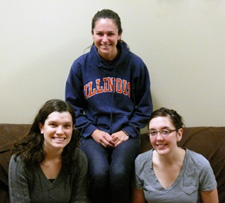James Scholars Launch New Course

Kristin Baskerville, Cara Gallagher, and Elizabeth Sams developed a course for their James Scholar colleagues
When Kristin Baskerville, Cara Gallagher, and Elizabeth Sams, all seniors in the Community Health degree program, decided to work together on their James Scholar project, their original idea was to develop a service project that would take place over Spring Break. Based on feedback from students, they realized that what they were hoping to do was simply not feasible. Still, they wanted to provide students with an experience outside of the classroom. "I’m taking a course in rural health now," Kristin said. "After talking, we thought that this would be something that a lot of students wouldn’t have experience with."
The three created a course for James Scholars that focused on comparing healthcare issues in an urban setting and a rural setting. The course involved three meetings in which students discussed readings and learned what the literature had to say about rural and urban health, and a capstone experience in which the students visited both an urban and a rural hospital to make their own comparisons. Elizabeth said in developing the course, she and her colleagues first came up with three learning objectives: to identify differences in patient demographics; to compare patient satisfaction; and to compare hospital administration and resource structures. "The learning objectives helped us to focus to ensure that we had the same experience in each hospital," she said. "We also tried to make the learning objectives relevant to everybody in the course, regardless of their major."
The women were able to arrange visits to Rush University Medical Center, a large teaching hospital in Chicago, and Iroquois Memorial, a 49-bed hospital in Watseka, Illinois. Among the interesting differences they found were the lack of anonymity for doctors in the rural hospital, who were part of the small community, and a potential lack of privacy since all the staff in the hospital would likely know all the patients. As expected, the urban hospital was able to offer specialists in just about any area, and their patient population was more diverse. The rural hospital largely admitted older adults.

Students who participated in the Urban and Rural Health course visited hospitals in Chicago and Watseka
While all the students reported greater awareness of health issues in different environments after the course, and greater respect for the work rural hospitals do, two of the students said they were now considering pursuing a health career in a rural setting. Kristin, Cara, and Elizabeth also benefited from the experience. Cara, who is pursuing a position in the Physician Recruitment Department of Rush, said the putting the course together gave her a lot to talk about in her interview. "They loved hearing about the learning experience we were able to give students," she said. "We were nervous about whether the students would take an active role during the visits, but they asked a lot of questions and were as excited as we were."
All three women agreed that while they were the course coordinators, they were learning right along with the other students. They know they’ll take the experience with them to everything they do in the health care field. Hopefully, they said, the other students will take the experience with them as well.